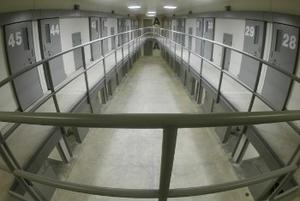Administration moves ahead on Illinois prison purchase -- possible Gitmo replacement
The Justice Department informed the Illinois congressional delegation that the White House was going ahead with consideration of the Thomson Correctional Center, located 150 miles west of Chicago, as home for some detainees from Guantanamo Bay; lawmakers opposing to moving terrorists to a U.S. prison blocked funding for refurbishing Thomson, but the administration says the Justice Department can purchase the prison and hold federal inmates in it

View of cell blocks at Thomson Correctional Center // Source: thomsoncorrectional.info
The Swamp’s Christi Parsons has an update on the story. He writes that a key official at the Justice Department said earlier this week that the Obama administration will purchase the Thomson prison even if Congress does not approve the president’s plan to lock up terror suspects there.
Lawmakers are threatening to scotch Obama’s proposal to move terror detainees to the unused state prison, a critical part of his plan to shut down the Guantanamo Bay detention center.
Even if lawmakers make good on that threat, a letter from Justice Department suggests, the federal government will simply use the facility to hold federal inmates.
Writing to members of the Illinois delegation in Congress, Assistant Attorney General Ronald Weich reaffirmed the administration’s “commitment to acquiring the facility this year,” and provided details about steps planned for the next few months.
The Justice Department’s Bureau of Prisons plans to hire and train employees while other administration officials “work with Congress to obtain authorization and funding for a portion of the Thomson facility,” Weich wrote in the letter, obtained by the Chicago Tribune Washington bureau.
Obama moved to shut down the controversial Guantanamo prison shortly after taking office, saying it had become a lightning rod for anti-American sentiment around the world and thus was a recruiting tool for Al Qaeda. Closing the prison has been difficult, however, as members of Congress decline to grant approval for transferring the Guantanamo detainees.
Also, in recent weeks, House lawmakers have moved to blocks federal funds for modifying the Thomson prison so it can accommodate the detainees. That measure, however, did not prohibit use of federal funding to actually buy the prison, and the letter to the Illinois delegation indicates the Justice Department wants to keep the Thomson option alive as negotiations continue with congressional leaders.
The decision to move ahead with the purchase may mean more local jobs for the communities around Thomson, located in western Illinois, not far from the Mississippi River.
Parsons writes that, all along, the Obama plan has been for the Defense Department to take a small part of the prison to house the Guantanamo detainees, staffed by military personnel from installations around the country.
Any portion of the prison not run by Defense Department would be operated by the Bureau of Prisons to house federal inmates. That part of the prison would be staffed in large part by residents of the surrounding communities.
Advocates of the project, including Senator Richard Durbin (D-Illinois), have been pushing for the federal government to go ahead and purchase the prison and work out the details later. Durbin has argued that such a “one-step-at-a-time” approach would spur local economic development in an area where it is badly needed while preserving the president’s options for closing Guantanamo.
When the plan was first floated, the White House Council of Economic Advisors estimated that federal operation of the facility would create at least 1,200 federal jobs at the facility, some 750 to 900 of which would go to local residents. If the facility is run entirely by the Bureau of Prisons, however, administration officials say all of the jobs would be local ones.
In the letter, Weich said he was writing to affirm what federal prisons chief Harley Lappin recently told members of the Illinois delegation — that the administration was moving forward with the purchase plans.
In fact, several appraisals of the property are taking place now, and the BOP has been meeting with local officials and prospective job applicants to talk about hiring, Weich writes. Since spring, there have been meetings in Fulton, Freeport, and Moline, Illinois, and in Davenport, Iowa, he said.
Officials are also planning events at local community colleges in the next few weeks to take applications and conduct resume workshops.
Parsons writes that Weich also notes the recent suggestion of Representative Don Manuzullo, who asked in May that the administration simply proceed as if it would run Thomson as a stand-alone federal prison. In response to that suggestion, Weich said, “We understand that Director Lappin explained that BOP will have access to the entire facility after it is acquired.”
Indeed, the bureau plans to hire and train “a full complement of staff” while the Pentagon works with Congress for approval of its separate plans, Weich writes.
